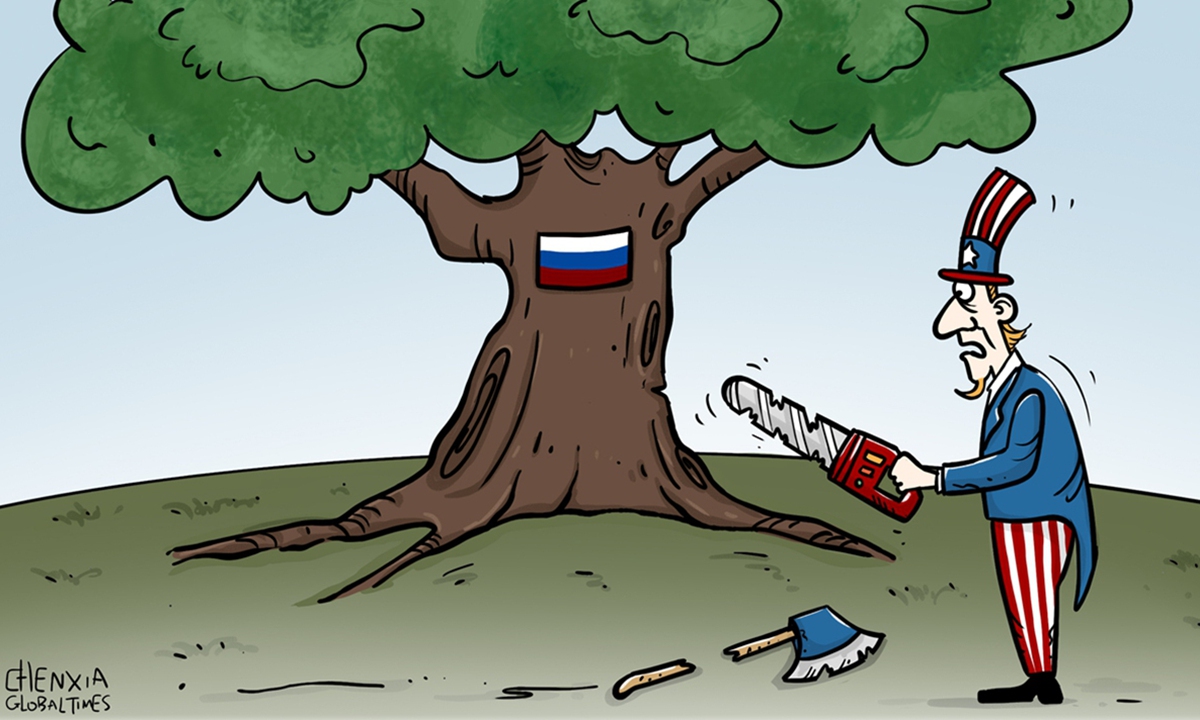
Illustration: Chen Xia/GT
There is a lot of debate in the West about how to evaluate Russia's economic development under Western sanctions.
In June, a New York Times article claimed that the Russian economy has shown "surprising resilience in the face of intense sanctions" imposed by the West and "it has become clear that the sanctions… have failed to completely dismantle the economy."
In July, an article by two Yale scholars published on Foreign Policy argued that "actually, the Russian economy is imploding." Based on Russia's fading consumer sentiment, soaring prices, supply shortages, budget deficit, and the claim that the ruble is the world's strongest-performing currency this year is only a myth, the authors concluded that "the Russian economy is reeling, and now is not the time to step on the brakes [of sanctions]."
In its August article, entitled "Why the Russian economy keeps beating expectations," the British newspaper The Economist listed three main factors why Russia can deal with Western sanctions: Russia's ability to "take swift action to prevent economic collapse"; Russian economy's partial detachment from the West, making the recent increase in isolation less painful; and sanctions' "limited impact on Russian oil output." This argument is generally acknowledged by some of the Russians that I have spoken with.
At a business forum, Alexander Shokhin, President of the Russian Union of Industrialists and Entrepreneurs, said that sanctions and the withdrawal of foreign companies have led to a severe decline in Russia's car production, but the problem is now being solved by building a new supply chain through actions like looking for new suppliers and assembling new models.
In mid-September, Russian president Vladimir Putin said that Russia is facing financial and technological aggression, but the tactics of economic blitzkrieg did not work. This is already obvious to everyone.
Sergey Glazyev, an economist who served as an adviser to the President of the Russian Federation, told me that for Russia, dealing with financial sanctions from Europe and the US is another parallel war. Russia's foreign exchange assets in the financial institutions of NATO countries reach $1.2 trillion, and the latter has at least $1.1 trillion of investments in Russia.
In response to Washington's continued sanctions, Russia has sold its US debt and will instead invest in euro, Chinese yuan, and gold assets. This parallel war will continue to cause changes in the global financial and monetary systems.
Georgy Ostapkovich, a professor at the National Research University Higher School of Economics, pointed out that from the standpoint of adapting to sanctions, Russia will have no difficulty surviving sanctions in 2022. But sanctions have a delayed effect, so 2023, or even 2024, is likely to reveal worse consequences. Of course, there are also some Russian experts I talked with who are optimistic. They believed the Russian economy will return to the level before the crisis in the next two years.
Since September, I have visited about 20 cities in Russia. I found that the prices of water, electricity, heating and gasoline in daily life have not fluctuated much, and the prices of bread and potatoes have also been kept low. For ordinary Russians with an average monthly income of about $600, there is no problem with living.
In response to Western sanctions, Russia is not fighting a completely unprepared battle. Even so, some Russian experts still believe that Russia needs to reflect more. Yury Babonov, the head of China of the Russian House of International Scientific and Technical Cooperation Association told me that Russian policymakers should learn from China's experience, which can not only fight to defend its interests externally, but also resolve conflicts and promote global cooperation.
He also proposed a comprehensive cooperation program that would better connect China and Russia on the social and educational levels and better integrate young students and society to handle a greater shock from the West. Babonov is right.
The Chinese people have mainly shown sympathy amidst Western sanctions against Russia, and they are learning from these experiences. When I spoke in depth with 20 Chinese business representatives, some said, "I hope the situation will be subsided soon. Russia is our second home, and it will be a major life change if there is unrest." Some of these people are now starting to reduce their inventories, while some are cutting credit transactions in an attempt to accelerate the repatriation of capital as much as possible to accommodate the uncertainty. But most people are convinced that there will definitely be opportunities to develop their businesses in Russia in the future.
The author is professor and executive dean of Chongyang Institute for Financial Studies at Renmin University of China. opinion@globaltimes.com.cn




